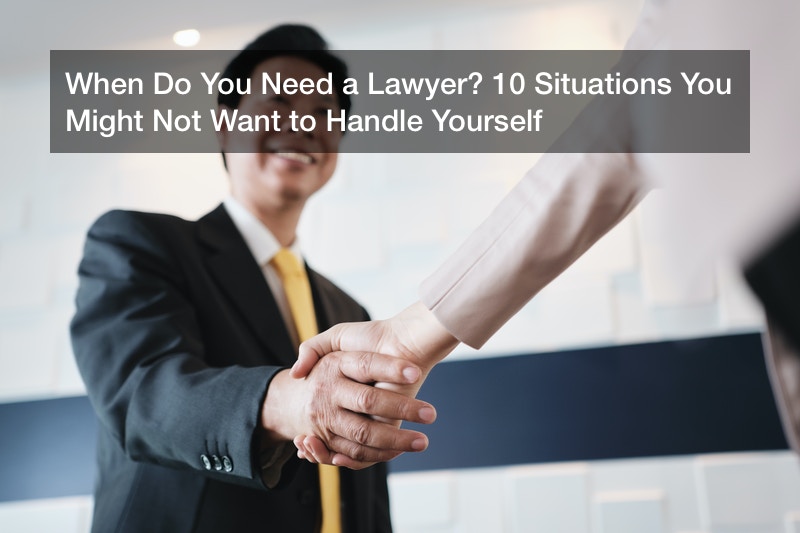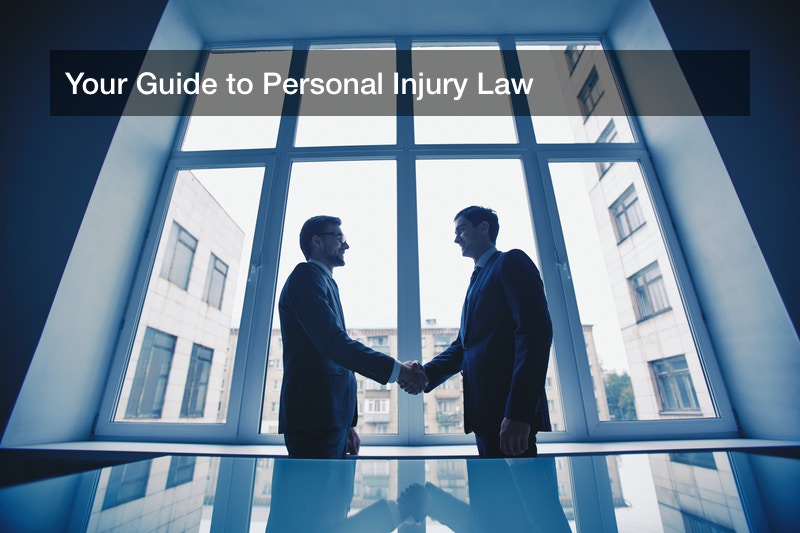
Most people hope to never hire a lawyer. Lawyers are viewed as expensive and, in some cases, unnecessary since many legal problems can be solved without a lawyer. For example, receiving a parking ticket or getting into a dispute with a building contractor about your unfinished backyard fence can probably be resolved by paying a fine or writing a forcefully worded letter.
However, some legal issues cannot be solved using do-it-yourself legal advice you find online. The issue may be too complicated, the work may be too involved, or the consequences may be too grave for you to handle it yourself.
When do you need a lawyer? Here are ten legal problems you might not be able to fix yourself:
Starting a New Business
Entrepreneurs start new businesses every day. However, hiring a business law attorney might be the most forward-looking step you can take.
For a business run and operated by a single owner, forming a limited liability company or corporation to protect your personal assets from any business lawsuits might be simple. Although it may be worthwhile to consult a lawyer or at least read up on forming a corporate entity.
When do you need a lawyer? If you have co-owners, investors, or creditors, you might want to hire a lawyer to make sure the business and your personal assets are properly protected. Just keep in mind that due to conflicts of interest rules, you might need to hire one lawyer for the business and a separate lawyer for yourself.
There are a few reasons why you might want to have a lawyer form your business under these circumstances:
- Co-ownership can be a huge benefit when you are starting out. Having more help and more financial resources can help your business get a running start. However, if the relationship between co-owners sours, a partnership agreement or operating agreement drafted by a lawyer can help the owners go their separate ways rather than spending years battling in court.
- Investors have certain expectations when investing in your business. While you might run your business out of passion, investors are usually motivated primarily by a return on their investment. Any action on your part could land you in court in a shareholder lawsuit if an investor thinks that you are failing in your fiduciary duties to make them money. A lawyer can guide you on how to avoid shareholder lawsuits.
- Creditors are even riskier than investors. Creditors often have a contractual right to be paid, and can seize collateral owned by your business if they are not paid. A lawyer can advise you on the terms in a loan agreement before you sign it so you can avoid disputes later on.
Getting Arrested
When people hear the word “lawyer,” their minds usually jump automatically to criminal law, and with good reason. Criminal defense is one of the most critical services lawyers offer to clients.

For many situations, you might not need a lawyer. An infraction, like a parking violation or moving violation that will result in a fine and points on your driving record. In other words, an infraction will not result in jail time, so it will likely not require a criminal defense lawyer.
When do you need a lawyer? You will need a lawyer when you are defending yourself against a misdemeanor or felony that could result in a substantial fine or jail time.
Fortunately, under the U.S. Constitution, every U.S. citizen is entitled to the assistance of counsel in all criminal prosecutions. This means that if you cannot afford a criminal defense lawyer, you can be represented by a public defender paid for by the state.
Getting Sued
After getting arrested, the next most likely reason for hiring a lawyer is getting sued. Again, some lawsuits can be resolved without a lawyer. For example, disputes in small claims court are almost always resolved without a lawyer.
Small claims lawsuits are reserved for disputes that are under a pre-determined value, like $500, as set by your state, county, or city. Judges in these cases, like judges on reality TV court programs, are usually much more involved in the case since there are usually no lawyers present.
When do you need a lawyer? Lawsuits in your state’s trial court, often called “district court” or “superior court,” have no limit on damages other than being greater than the minimum set for small claims. In other words, if small claims court handles disputes worth less than $500, the district court (or superior court) will handle disputes worth more than $500.
If you do not hire a lawyer, your consequences might include:
- Judgment: You might lose the lawsuit due to a technical error, like missing a deadline, or for substantive reasons, like you did not present an adequate defense.
- Monetary damages: You might be ordered to pay the person suing you.
- Garnishment and seizure: Once you are subject to a damages award, the plaintiff has many options to pursue payment, including asking local law enforcement to seize personal or business property and sell it at auction, garnishing your wages, and attaching your bank accounts.
You could be sued for a variety of reasons, including a property dispute, business disagreement, or past due bills. However, one common basis for a lawsuit is personal injury. If you are involved in a vehicle accident and you were the driver at fault, do not be surprised if you and your insurance company get a letter from a car accident attorney demanding payment for anyone injured in the accident. Delaying a response could result in a lawsuit that could ruin your finances for the rest of your life.
Getting Injured
On the other hand, if you were injured due to someone else’s actions, you should also consider hiring a lawyer. For example, if you have been injured in a car accident, slip-and-fall accident, or due to medical malpractice, you could incur thousands of dollars in medical bills. If you injuries render you unable to work, you may also have hundreds or thousands of dollars in lost wages.

It would be unfair for you to bear these expenses if you were not at fault for your injuries. Even if you have health insurance, you will have deductibles, co-pays, and other out-of-pocket expenses to pay for your treatment. If your injury causes you to miss work, you may even lose your health insurance and have to pay all these expenses on your own.
When do you need a lawyer? In complex cases, like medical malpractice, talking to a lawyer might be essential to receiving compensation. Doctors are covered by malpractice insurance and very few insurers will take your claim seriously without medical malpractice lawyers. A lawyer can help you collect the evidence necessary for your claim, including medical records, expert opinions, and eyewitness testimony. Moreover, a lawyer can negotiate with the insurer and, if settlement cannot be reached, try the case before a judge or jury.
Getting Injured at Work
People who are injured at work are governed by different rules than other people who are injured. Worker’s compensation was created to ensure that every injured employee can receive medical treatment regardless of the reason for the on-the-job injury. On the other hand, injured workers waive the right to sue their employer.
The result of this trade-off is that employees receive reimbursement for medical expenses incurred as the result of an on-the-job injury regardless of whether the employee was at fault, the employer was at fault, or it was merely an accident.
On the other hand, in some states, worker’s compensation is somewhat notorious for its low reimbursement rates and its narrow definition of “necessary” treatment. However, since employees waive the right to sue their employers, they often have no other way to pay for their medical treatment.
When do you need a lawyer? You might need a workers compensation lawyer to help you submit your workers’ compensation claim to reduce the likelihood of rejection. Similarly, If your workers’ compensation claim has already been denied, you might need a lawyer to help you challenge the denial.

Most importantly, you might need a lawyer to help you figure out if any third parties might have been responsible for your injury. For example, if your employer-supplied safety equipment failed, you might be able to sue the manufacturer of the safety equipment.
Divorcing
Each weekend sees an average of 44,230 weddings. Unfortunately, about 39% of those marriages end in divorce.
Division of property is one of the primary purposes, and one of the most contentious processes, in a divorce. Some states use a system called community property which states that every piece of property (with very few exceptions) acquired after marriage belongs to the marital community and is divided equally upon divorce. Other states use an equitable division of property to account for factors like which spouse has custody of children, which spouse has a job, and how much each spouse contributed financially to the marriage.
When do you need a lawyer? There are all kinds of tricks that people use to cheat their spouses out of their fair share. Lawyers can help investigate whether there are hidden assets. A lawyer can also help a spouse make sure that any exceptions are properly applied so all the shared property is split fairly.
Battling for Child Custody
The most difficult issue, after divorce, that family law attorneys deal with is child custody. Child custody issues often come up in divorce proceedings, but they can also arise in other contexts including:
- The child’s parents die.
- The child’s parents are not able to take care of the child due to mental illness, physical disability, or substance addiction.
- The child has been abandoned or neglected.
The mandate of the courts during child custody determinations is to do what is in the best interests of the child. In fact, in some child custody determinations, a judge may even appoint a lawyer to act as guardian ad litem to represent the child’s legal interests before the court.
When do you need a lawyer? Almost all the time. Child custody can be emotional and this is a good time to let a trained lawyer handle your case with passion, but with professionalism.
Declaring Bankruptcy
Bankruptcy is a legal procedure to settle debts in exchange for protection from creditors. A person or business can file for bankruptcy whenever their assets and income are not sufficient to pay their debts.
Bankruptcy can take two forms — chapter 7 liquidation and chapter 13 reorganization. Liquidation requires that the bankrupt person or business sell off their assets to pay off creditors. However, once the creditors are paid from the sale proceeds, the debts are discharged.
Chapter 13 reorganization is a way for the petitioner to restructure their debts so their credits can be repaid, albeit less than owed, over a longer period of time. Once the restructuring plan is carried out, the debts are discharged.

When do you need a lawyer? Individuals are allowed to file a bankruptcy petition without a lawyer. However, most want a bankruptcy lawyer so any exempt assets can be protected and all eligible debts can be included in the discharge. Without these protections, bankruptcy might not provide the petitioner with its full benefits.
Suffering a Property Loss
If your home is destroyed in a natural disaster, such as a wildfire, flood, or storm, your insurance should cover your loss. However, sometimes insurance companies do not meet their contractual obligations. Importantly, if the insurance company does it in bad faith, meaning that the insurance company knows it should pay, but does not, it can be hit with punitive damages.
When do you need a lawyer? Most of the time, an insurance claim is processed properly. If your insurance company delays and misrepresents the facts about your loss, gives you the runaround rather than working on your claim, or declare bankruptcy in the face of widespread claims (such as those caused by a hurricane), you may want to discuss your case with an insurance lawyer.
Planning Your Estate
Wills and trusts are the best way to accomplish a few goals:
- Ensure your property goes where you want it to go.
- Minimize estate taxes and probate costs.
- Make sure assets are available to take care of you if you become disabled.
When do you need a lawyer? Wills and trusts can be tricky. For example, a will that is handwritten or lacks witnesses is not enforceable in court. This means that your wishes may not be carried out even if you put them down in writing. An attorney, however, would have the training and skill to put together an estate plan to ensure your family is taken care of.
You might make it through life without hiring a lawyer. However, most people will hire a lawyer. Sometimes, it is for planning and for positive purposes like planning their estate or forming a business. On the other hand, sometimes it is not under ideal circumstances like getting arrested, getting sued, declaring bankruptcy, or getting a divorce. In either case, a lawyer can act with professionalism and expertise in representing your interests, providing counsel and advice, and preparing the legal documents you need to carry out your goals.



